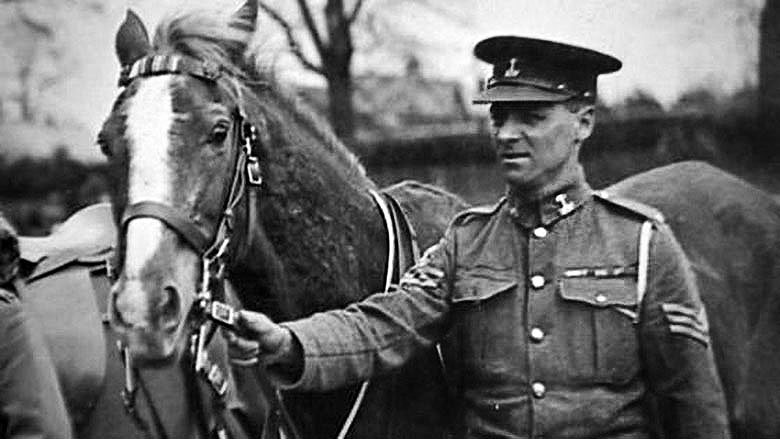7 – Songster
Mary Baird who has nominated him says where Songster – a handsome chestnut horse – came from no one appears to know. He was mobilised with other horses in Loughborough Market on August 4, 1914, and taken to France with The Prince Albert's Own Yeomanry in November that year, with Trooper Bert Main in the saddle.
Songster was one of the few horses to return to England in 1919 and, having been notified the horse would be up for sale, Bert purchased him. He was taken to West Beacon Farm to be placed in harness by ex-Squadron Sergeant–Major Harry Poole.
Mary tells us there are many stories of Songster’s achievements. With Trooper Bert in the saddle, Songster cantered to victory in a cross-country race in France. But a more remarkable story concerning the horse is of his ability to climb stairs. On many occasions Songster was ridden by Bert up the stairs leading to the clubroom at the Old Boot Hotel, Loughborough, and after walking proudly round the room the horse would achieve the even more difficult task of descending the stairway.
But his Leicestershire Yeomanry connections were not severed on his return from France. Songster had not had time to forget the meaning of the bugle calls it was claimed he understood, before he was clicking his heels to the sound of the band passing by his field en route for camp in 1920. The Unit’s annual camp claimed Songster until 1935 when although leading a more leisurely life, Songster continued to make his weekly appearance in Loughborough, drawing a milk float to Loughborough Market.
One day some Yeomanry colleagues called at West Beacon Farm at the conclusion of a day’s shooting and it was while they were enjoying a cup of tea with Harry Poole that the old veteran horse - aged 40 - collapsed in his field. A barn door was taken off its hinges and with tender care Songster was rolled over on to this and carried into the stable. R.Q.M.S. Hunter said that just before the old horse died he looked at him as much as to say “I am done.”
He is buried in the field he had grazed in for so many years. Upon the horse’s head in the rough grave excavated for him, the ribbons and medals were placed with solemn dignity. These were two Mons stars, a General Service Medal, the Victory medal, and two Territorial Long Service medals which, with ribbons, had been awarded the horse by the Regiment.
Bert Main and Harry Poole made a grave marker for Songster and a replica of the original now marks his grave at West Beacon Farm and kind folk in the town had an armature - an open sculpture made of wire which was unveiled in June 2019 (pictured below).
A children’s book has been written about Songster’s exploits during and after the war and can be purchased directly from the Loughborough Carillon. Search for the seller carillonsales on eBay or search for Songster. The book costs £6.99 with freepost. All the profit goes to the Loughborough Carillon Tower and War Memorial Museum charity in the town.





